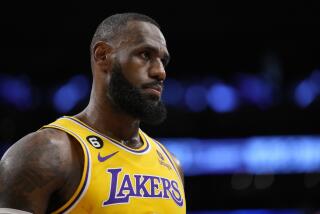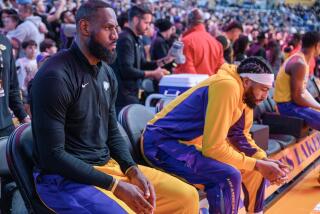NBA three-peat is not as easy as 1, 2, 3
- Share via
Nobody wants the party to stop after two consecutive title parades, so you do what you can to keep the confetti on back order.
Sometimes it means surrounding your passel of superstars with a veteran beset by questionable knees and a forward who, despite his athletic upside, just doesn’t seem to get it.
Miami’s Greg Oden and Michael Beasley?
Well, yes, but it was also the means to a championship for the 2001-02 Lakers, the last NBA team to win a third consecutive title.
Those Lakers added Mitch Richmond and Samaki Walker to the core that had partied at 11th and Figueroa the previous two summers. Richmond played sparingly and Walker often appeared lost in the triangle offense.
Ultimately, it was the Lakers’ legends and a fortuitous bounce that powered the team through the injuries and the monotony of the regular season and the epic playoff series against the Sacramento Kings.
The tandem of Shaquille O’Neal and Kobe Bryant was more than most teams could handle, on the nights O’Neal’s troublesome toes allowed him to play. Surgery before the season on a deformed left toe caused O’Neal to favor his right foot, leading to pain in his arthritic right big toe and forcing him to miss 12 regular-season games.
“We were saving him in practice,” former Lakers coach Phil Jackson recalled Friday. “He was talking about how he was going to get through that. He was flat-footed a lot instead of using your big toe. It limited a lot of what he could do but he was still a force.”
For the season’s first five weeks, the Lakers really did make winning back-to-back-to-back titles look as easy as one, two, three. They started 16-1 even with point guard Derek Fisher sidelined the first 12 games while recovering from foot surgery. Then came a handful of stretches without O’Neal and a midseason malaise in which the Lakers went 19-15.
“Complacency was a little bit of an issue,” said Lakers player development coach Mark Madsen, who was then the team’s power forward. “You’ve won it twice in a row, you kind of think, oh, it’s automatic, it’s just going to happen. But no. I mean, you have to work for it, you have to fight for it.”
It helped that O’Neal and Bryant were no longer the begrudging teammates they had been for much of their first four seasons together. This was never more evident than on the January night Bryant had his high school jersey retired in Ardmore, Pa. O’Neal lumbered to the stage and extended his hand, soon feeling Bryant’s arms wrapped around his massive body instead.
“At that point, they were quite comfortable,” Jackson said. “It wasn’t till after that season that things got a little bit difficult between them.”
The Lakers entered the playoffs with the third-best record in the Western Conference, continuing a trend in which Jackson’s teams that won a third consecutive title experienced a backward slide in regular-season success. His Chicago Bulls teams twice won three consecutive titles, averaging 59.5 wins in the third season as opposed to 67.2 in the first and second. It was the same with the Lakers, who won 58 games, down from the 61.5 they had averaged the previous two seasons.
“I don’t know if it was the diminished personnel we had,” Jackson said, “but every three-peat I’ve been associated with, every year the team dropped off in wins.”
Bryant didn’t burden himself with the particulars of the regular season, believing his team would recapture the drive it needed. “When the playoffs come around,” he said recently, “it just kicks right back into gear and the hunger and what you’re playing for, everything just comes right back.”
It returned quickly as the Lakers swept the Portland Trail Blazers and then dispatched the San Antonio Spurs in the conference semifinals in a breezy five games.
Fortunately, the conference finals against Sacramento packed enough drama for three series. There was the room-service cheeseburger and slice of cheesecake that caused Bryant to become violently ill before Game 2. There was the 40-25 free-throw discrepancy in favor of the Lakers in Game 6 that prompted a national referendum on NBA officiating.
And, most memorably, there was the sequence of events that resulted in the ball finding Robert Horry’s hands at the end of Game 4. With the Lakers trailing by two points and less than 10 seconds to go, Bryant drove and missed. O’Neal botched the putback. Sacramento’s Vlade Divac then tapped the ball out toward the perimeter, where Horry collected it and rose for the three-pointer that gave the Lakers a 100-99 triumph.
“I can remember just looking at that ball in the air and going, ‘Oh, my god,’” said Richmond, now a part of the Kings’ new ownership group. “I mean, you couldn’t have scripted anything better. Horry really saved it.”
The Lakers eventually had to overcome a 3-2 series deficit and the presence of Mike Bibby, whose shot-making made him the breakthrough star of the playoffs. Curiously, in the final minutes of a Game 7 that went to overtime, Kings star forward Chris Webber shrank from the moment with stunning passivity.
“Bibby was the only one doing it and nobody else was doing it,” said Lakers assistant coach Kurt Rambis, who also served in that capacity under Jackson. “I’m going, my goodness, they have a chance to beat us right here and guys just didn’t step up to the plate.”
The Lakers won the deciding game, 112-106, a prelude to a nondescript Finals they would win in four games over the New Jersey Nets.
Now the Heat is attempting to become only the fourth NBA franchise to win as many as three consecutive titles. In addition to the Lakers and the Bulls, the Boston Celtics won eight in a row in the 1950-60s and the Minneapolis Lakers won three from 1952 to ’54.
Miami enters the season with injury concerns similar to what the Lakers experienced a dozen years ago. Dwyane Wade’s bothersome knees might be a seasonlong issue and Oden’s knees could support only a four-minute cameo in the preseason.
There will be nights when not even the singular brilliance of LeBron James is enough.
“It’s a tough grind, more so than winning back to back, because you end up with everybody gunning for you every single ballgame,” Rambis said. “And guys are fighting the reward syndrome, for lack of a better term. They’ve already been rewarded with titles. Can they do it again? Can they muster up the focus, the intensity and the drive to want to do it again?”
The Lakers found the formula. The Heat will learn whether it can find that three-peat magic soon enough.
Twitter: @latbbolch
Times staff writer Mike Bresnahan contributed to this report.
More to Read
Go beyond the scoreboard
Get the latest on L.A.'s teams in the daily Sports Report newsletter.
You may occasionally receive promotional content from the Los Angeles Times.











